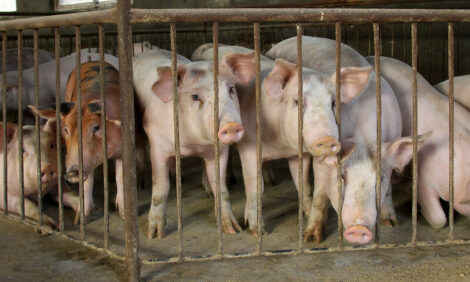



As Canadian Imports Dip, Demand for Iowa Corn Cut
IOWA, US - As recently as 2008, the Canadian province of Manitoba sent almost 2.8 million newly weaned pigs to Iowa to eat enough corn to grow from 14 pounds to the 270-pound weight for slaughter.DesMoinesRegister.com reports that this year, the youthful pig imports from Canada will likely be little more than 1.5 million.
That will mean a drop in demand for Iowa's corn. A hog typically eats between 10 and 11 bushels of corn during its five or so months of life before going to the slaughterhouse.
Manitoba's shipments of hogs to the United States for slaughter may be down as much as 90 percent this year. Analysts cited that as a reason why Smithfield Foods is closing the John Morrell plant in Sioux City that traditionally was a destination for Canadian hogs.
The Canadian government is paying their hog producers to get out of the business, hoping to raise prices. But Karl Kynoch, chairman of the Manitoba Pork Council, said there's a bigger reason for the decrease in the number of pigs coming south.
"The problem is the country-of-origin labeling law," Mr Kynoch said. The act of the US Congress that went into effect last year required that all meat packages be labeled with the land of the animal's birth.
"Actually, a Canadian weanling - a pig taken from its mother at 14 pounds - who gains most of its weight in an Iowa barn eating Iowa corn is really more of an Iowa animal by the time it goes to slaughter," said Mr Kynoch, who visited the Iowa Pork Congress in Des Moines on Thursday.
Mr Kynoch said he has pretty much abandoned his own Manitoban sow operation to spend about half the year on the road to promote Canadian pork and battle export barriers such as the US labeling law.
As he moved about Hy-Vee Hall during the show, he encountered several Iowa hog feedlot operators who said they would like to get contracts to feed Canadian pigs, but have been rebuffed, he said.
The Canadians are preparing a complaint to the World Trade Organisation that the labeling law is an illegal restraint of international trade.
"We think this is a legitimate trade issue," Mr Kynoch said. He added that Iowa should be on Canada's side.
"For years, we have sent our weanlings to Iowa because Iowa has the corn to feed and we don't," Mr Kynoch said. "Our hogs represent a good portion of the demand for Iowa corn."
Many Iowa hog feeders who wished to avoid the expense and labor of farrowing and weaning hogs and just feed them traditionally have bought much of their inventory from Canada.
The new president of the Iowa Pork Producers Association, John Weber of Dysart, said he is sympathetic to the Canadians.
"They're getting killed," he said. "The (labeling) law is a good example of the law of unintended consequences."
When the labeling portion of the law went into effect last year, meatpackers such as Smithfield, Tyson and Excel said it would be prohibitively expensive to separate US hogs and pork from imports.








